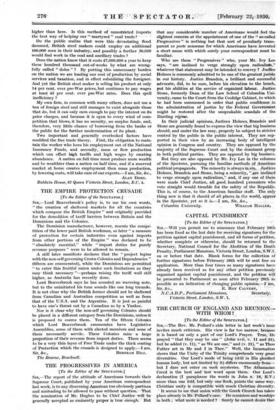THE EMPIRE PROTECTION CRVSADE [To the Editor of the SPECTATOR.]
-
Lord Beaverbrook's policy is, to use his own words, " the creation of sheltered- markets for all the countries which compose the British Empire" and originally provided for the demolition of tariff barriers between Britain and the - Dominions and the Colonies. . ' The Dominion manufacturer, however, resents the compe- tition of the lower paid British workman, so later " a measure of protection for certain industries even against imports from other portions of the Empire " was declared to be " absolutely essential," while " import duties for purely revenue purposes " were to be allowed to remain.
A still later manifesto declares that the " project begins with the non-self governing Crovin Colonies and Dependencies (fifteen are enumerated), while the Dominions are permitted " to enter this fruitful union under such limitations as they May think necessary "—perhaps raising the tariff wall still higher, as Australia has recently done.
Lord Beaverbrook says he has sounded no wavering note, but to the uninitiated his tune sounds-like one long tremolo. It is not clear why the British farmer should not be sheltered from Canadian and Australian competition as well as from that of the U.S.A. and the Argentine. It is just as painful to have one's throat cut by a Canadian as by a Yankee.
Nor is it clear why the non-self governing ColOnies should be placed in a different category from the Dominions, unless it is proposed to coerce them. Ten of the fifteen Colonies which Lord Beaverbrook enumerates have Legislative Assemblies, some of them with elected members and none of them • necessarily servile. These Colonies raise • a large proportion of their revenue from import duties. There seems to be a very thin layer of Free Trade under the thick coating of Protection which the crusade is designed to apply.—I am,










































 Previous page
Previous page